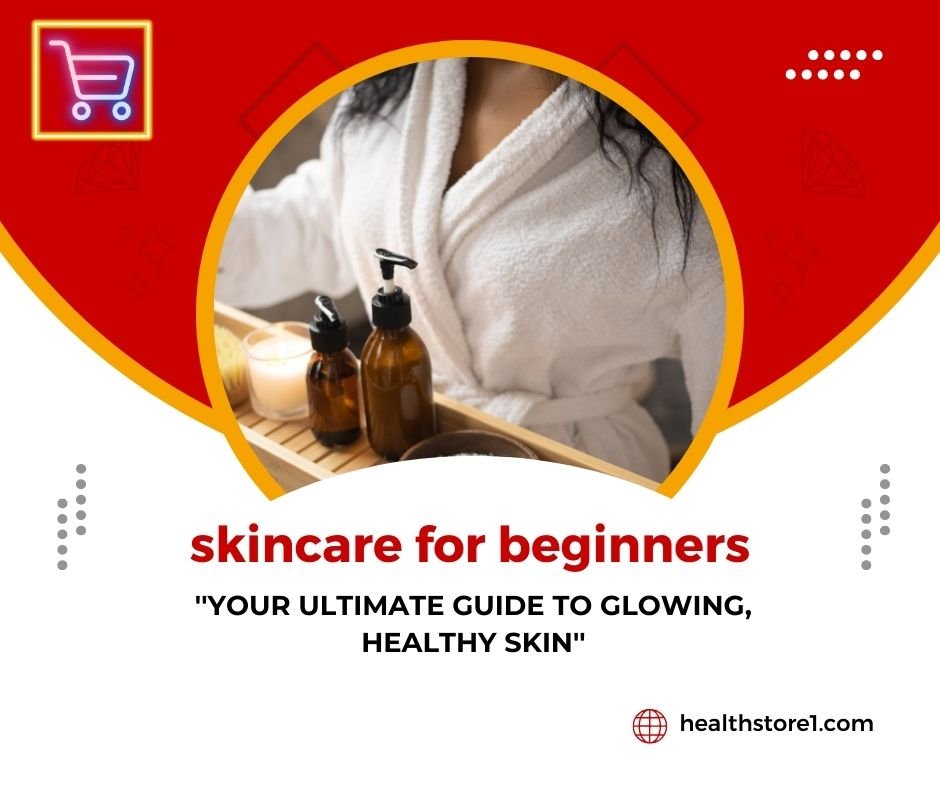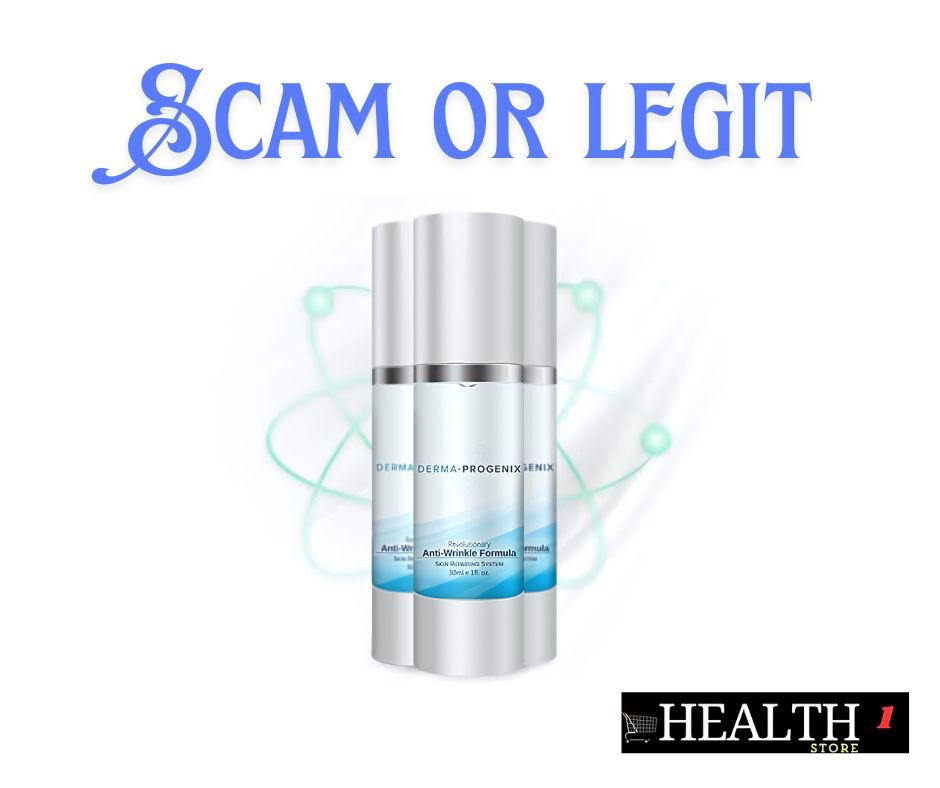Introduction to skincare for beginners
Taking care of your skin doesn’t have to be complicated. If you’re just starting out and feel overwhelmed by all the advice and products out there, don’t worry—you’re not alone. This guide to skincare for beginners will simplify everything you need to know to build an easy and effective skincare routine, tailored just for you!
In this “skincare for beginners” article, you’ll discover:
- Why skincare is essential for everyone.
- A simple, step-by-step skincare routine.
- How to pick the right products for your skin type.
- Extra tips for achieving glowing skin at any age.
Let’s break it all down!
Table of Contents
Skincare for beginners
Why Skincare for beginners is Important
Your skin is your body’s largest organ, and it serves as your first defense against the outside world—pollution, bacteria, and sun exposure, to name a few. Skincare isn’t just about looking good; it’s about protecting and maintaining the health of your skin.
Here’s why skincare should matter to you:
- Prevention: A solid skincare routine can help prevent common issues like acne, fine lines, and wrinkles.
- Protection: Sunscreen is a critical part of any routine, shielding your skin from harmful UV rays that cause premature aging.
- Hydration: A good moisturizer locks in hydration, keeping your skin soft and plump.
Skincare for Beginners: The Basic Routine
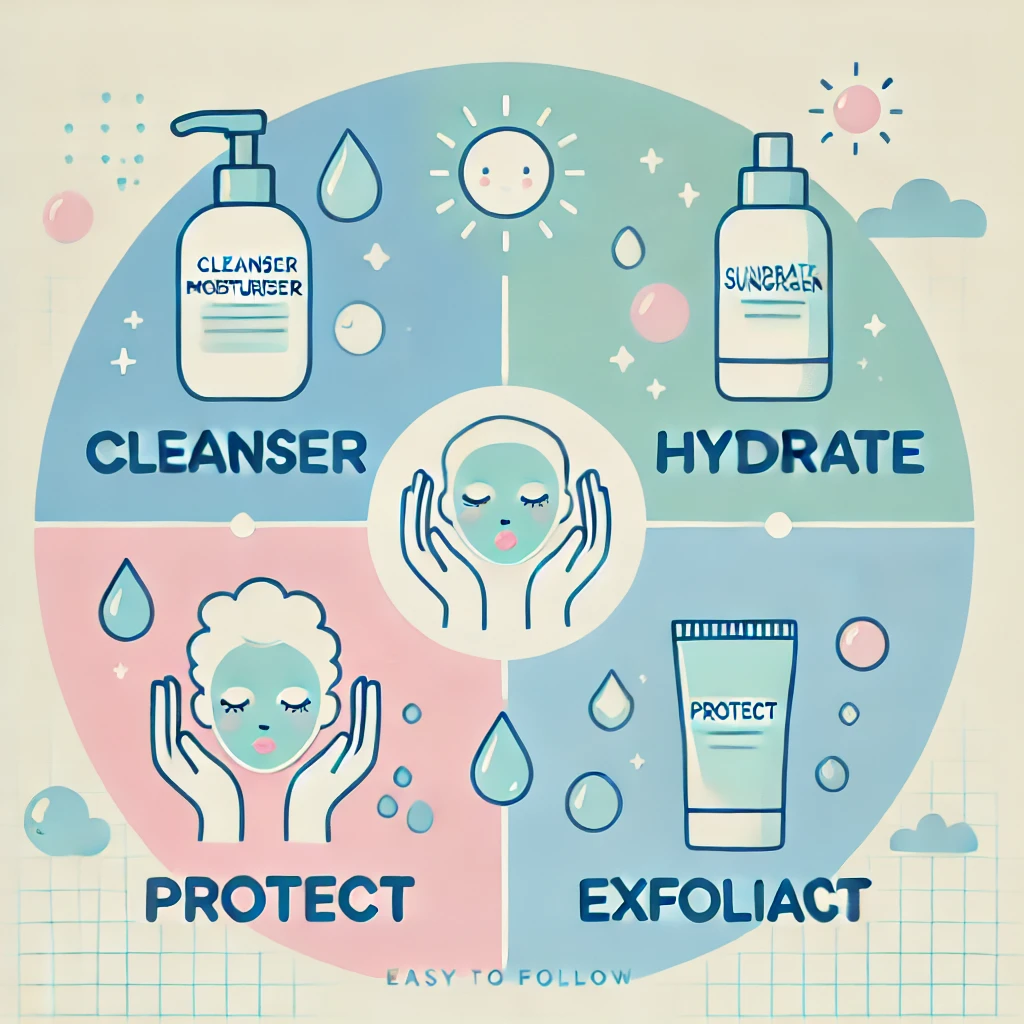
If you’re just getting started with skincare, simplicity is key. You don’t need dozens of products to achieve healthy skin. Let’s break it down into four essential steps that are easy to follow:
1. Cleanser
The first step in any skincare routine is cleansing. This removes dirt, oil, and makeup, preparing your skin for the next steps. Choose a cleanser that works for your skin type:
- Oily skin: A foaming or gel cleanser that helps control excess oil, preferably with ingredients like salicylic acid.
- Dry skin: A cream-based cleanser with hydrating ingredients like glycerin or ceramides.
- Sensitive skin: Look for a gentle, fragrance-free cleanser to avoid irritation.
Tip: Cleanse your face twice a day—once in the morning and once at night—to keep your skin fresh and clear.
2. Moisturizer
Moisturizing is crucial for all skin types. Even if you have oily skin, you still need to hydrate your skin properly. Moisturizers work by sealing in moisture, keeping your skin barrier healthy and preventing dehydration.
- Oily skin: Go for a lightweight, oil-free moisturizer.
- Dry skin: Use a thicker, more emollient cream to keep your skin hydrated throughout the day.
- Combination skin: A balanced moisturizer that’s not too heavy or too light will work best for you.
3. Sunscreen
No matter the weather or season, sunscreen is a non-negotiable step. It protects your skin from harmful UV rays, which can cause premature aging, sunburn, and increase the risk of skin cancer.
- Use a broad-spectrum sunscreen with SPF 30 or higher.
- Reapply every 2-3 hours, especially if you’re outdoors.
Fun Fact: Did you know that wearing sunscreen daily can reduce your risk of skin cancer by up to 50%?
4. Exfoliation (Optional, 2-3 Times a Week)
Exfoliating is an optional step, but it can make a big difference by removing dead skin cells, helping to reveal smoother, brighter skin. Be careful not to over-exfoliate, which can lead to irritation and damage your skin’s protective barrier.
- Chemical exfoliants (like glycolic acid or salicylic acid) are gentler and often more effective than physical scrubs.
- Physical exfoliants should be used sparingly, especially if you have sensitive skin.
How to Choose the Right Products for Your Skin Type
One of the most important aspects of building a skincare routine is picking the right products based on your skin type. Here’s a quick guide:
| Skin Type | Signs | Best Ingredients |
|---|---|---|
| Oily | Shiny, large pores, prone to breakouts | Salicylic acid, tea tree oil, niacinamide |
| Dry | Flaky, rough texture, feels tight | Hyaluronic acid, glycerin, shea butter |
| Combination | Oily in the T-zone, dry on the cheeks | Balancing ingredients like niacinamide and hyaluronic acid |
| Sensitive | Redness, irritation, reacts easily to products | Aloe vera, chamomile, fragrance-free products |
| Normal | Balanced, not too oily or dry | Gentle, hydrating ingredients |
To identify your skin type, observe how your skin feels after cleansing. If it feels tight and dry, you likely have dry skin. If it becomes shiny throughout the day, you may have oily skin. If it feels both oily in some areas and dry in others, you’re probably dealing with combination skin.
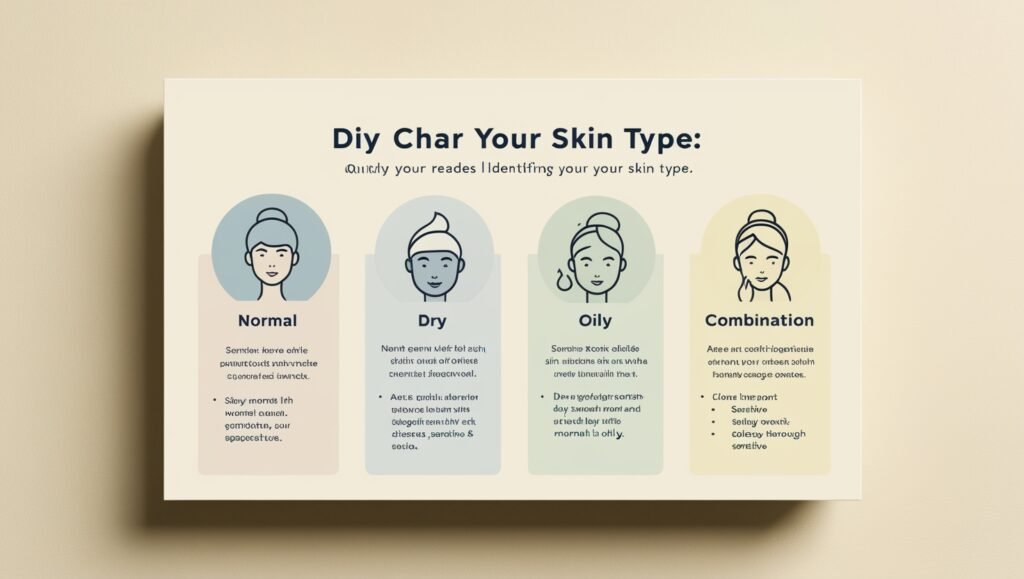
Skincare for Beginners: Do’s and Don’ts
Do’s:
- Do a patch test: Test any new product on a small area of skin to see how it reacts before applying it all over your face.
- Do introduce products slowly. Start with a cleanser, moisturizer, and sunscreen. As your skin adjusts, you can add serums, toners, and exfoliants gradually.
- Do keep it simple: Especially in the beginning, less is more. Stick to the essentials and avoid overwhelming your skin with too many products at once.
Don’ts:
- Don’t skip sunscreen: Sunscreen is the most important product in any skincare routine—don’t leave the house without it.
- Don’t over-exfoliate: While exfoliation can be helpful, doing it too often can damage your skin.
- Don’t use too many active ingredients at once. Combining ingredients like retinol, AHAs, and BHAs can cause irritation if you’re not careful.
Skincare Myths That Beginners Should Ignore
Myth 1: Oily Skin Doesn’t Need Moisturizer
Many people with oily skin believe they don’t need moisturizer, but this is a misconception. Skipping moisturizer can actually cause your skin to produce more oil, leading to even more shine and breakouts.
Myth 2: Natural Ingredients Are Always Better
While natural ingredients can be beneficial, they aren’t always superior to synthetic ones. The key is to find products with ingredients that work for your skin, whether they’re natural or lab-formulated.
Myth 3: Expensive Products Are Always Better
The price tag on a product doesn’t necessarily reflect its quality. There are plenty of affordable skincare brands that offer excellent, effective products. It’s all about finding what works for your skin.
Best Beginner Skincare Products to Try
To help you get started, here are some popular skincare products that are both beginner-friendly and affordable:
| Product | Purpose | Ingredients | Skin Type |
|---|---|---|---|
| CeraVe Hydrating Cleanser | Cleanser | Ceramides, hyaluronic acid | Dry, sensitive |
| La Roche-Posay Toleriane | Moisturizer | Niacinamide, glycerin | All skin types |
| Neutrogena Hydro Boost Gel | Moisturizer | Hyaluronic acid | Oily, combination |
| The Ordinary Niacinamide 10% | Serum (for oil control) | Niacinamide, zinc | Oily, combination |
| EltaMD UV Clear SPF 46 | Sunscreen | Zinc oxide, SPF 46 | All skin types |
Skincare for Beginners: Different Age Groups
Skincare needs change as you age, so it’s important to adjust your routine accordingly.
In Your 20s
Focus on prevention and protection. Stick to the basics: cleanser, moisturizer, and sunscreen. You can also start incorporating antioxidant-rich products like vitamin C serums.
In Your 30s
Begin using anti-aging ingredients like retinol and peptides to stimulate collagen production and keep your skin firm.
In Your 40s and Beyond
Focus on hydration and moisture retention. Look for serums with hyaluronic acid, peptides, and rich moisturizers to help reduce the appearance of fine lines and wrinkles.
Skincare for beginners: Statistics to Keep in Mind
Here are some eye-opening statistics about skincare that might surprise you:
- 40% of people aren’t aware of their skin type and use the wrong products as a result.
- 70% of adults don’t wear sunscreen daily, even though it’s crucial for preventing premature aging and skin cancer.
- 60% of skincare beginners don’t realize the importance of doing a patch test before using new products.
FAQs about skincare for beginners
Here are some frequently asked questions (FAQs) about skincare for beginners, along with concise answers:
1. What is the most basic skincare routine for beginners?
- A basic routine includes three steps: cleansing, moisturizing, and sun protection. Start with a gentle cleanser, follow with a hydrating moisturizer, and finish with a broad-spectrum sunscreen (SPF 30 or higher).
2. How do I know my skin type?
- After washing your face, wait an hour without applying products. If your skin feels tight, it’s dry. If it becomes shiny, you likely have oily skin. If it’s oily in some areas (like the T-zone) but dry in others, you have combination skin. If you experience no significant changes, you have normal skin.
3. What ingredients should I look for in beginner-friendly products?
- For oily skin: salicylic acid, niacinamide.
- For dry skin: hyaluronic acid, ceramides.
- For sensitive skin: aloe vera, chamomile, fragrance-free products.
- For normal skin: gentle hydrating ingredients like glycerin or vitamin E.
4. How often should I wash my face?
- It’s recommended to wash your face twice a day—once in the morning and once at night. Over-cleansing can strip the skin of natural oils, causing dryness or irritation.
5. Do I need to use sunscreen indoors?
- Yes, especially if you’re exposed to sunlight through windows or spend a lot of time near screens that emit blue light. UV rays can penetrate windows, so it’s essential to protect your skin with sunscreen daily.
6. Can I use the same moisturizer day and night?
- Yes, but if possible, use a lighter, oil-free moisturizer during the day and a richer one at night. Some night moisturizers are formulated to help skin repair and hydrate overnight.
7. How soon will I see results from my skincare routine?
- Consistency is key. Depending on the product and your skin’s condition, it can take anywhere from 4 to 8 weeks to start seeing noticeable changes.
8. What’s the difference between a physical and chemical exfoliant?
- Physical exfoliants use small particles to manually scrub away dead skin cells, while chemical exfoliants (like glycolic or salicylic acid) dissolve dead skin cells on a deeper level. Chemical exfoliants are generally gentler on the skin.
9. How often should I exfoliate my skin?
- Exfoliate 1-3 times a week, depending on your skin type. Over-exfoliation can lead to irritation and damage, so it’s important to not overdo it.
10. Should I apply skincare products to damp or dry skin?
- Most products, like moisturizers and serums, are more effective when applied to slightly damp skin because it helps with better absorption. However, products like exfoliants or acne treatments should be applied to dry skin.
11. What’s the best order to apply skincare products?
- The general rule is to apply products from thinnest to thickest: cleanser, toner (if using), serum, eye cream (optional), moisturizer, and finally sunscreen.
12. Are natural or organic products better for beginners?
- Not necessarily. While natural products can be beneficial, they can also cause allergic reactions or irritations for some skin types. What matters most is that the product is suitable for your skin type and concerns, whether natural or not.
13. How can I avoid irritating my skin as a beginner?
- Start with a simple routine using products formulated for your skin type. Avoid using too many active ingredients like retinoids, acids, or strong exfoliants at once, and always patch test new products on a small area of your skin before full use.
14. Is it normal to break out when starting a new skincare routine?
- Some people experience “purging,” which is a short period where breakouts may increase as your skin adjusts to new products. This usually happens with active ingredients like retinol and should clear up within 4-6 weeks. If irritation persists, consult a dermatologist.
15. When should I see a dermatologist?
- If you have persistent skin issues like acne, rosacea, or eczema that over-the-counter products aren’t helping, it’s best to consult a dermatologist for a professional diagnosis and treatment plan.
Conclusion of skincare for beginners: Start Your Skincare Journey Today!
Building a skincare routine doesn’t have to be daunting. Sticking to the basics—cleanser, moisturizer, and sunscreen—will set the foundation for healthy, glowing skin. Remember, skincare is a journey, and it’s all about consistency. Once you feel comfortable, you can begin adding other products like serums and exfoliants to target specific concerns.
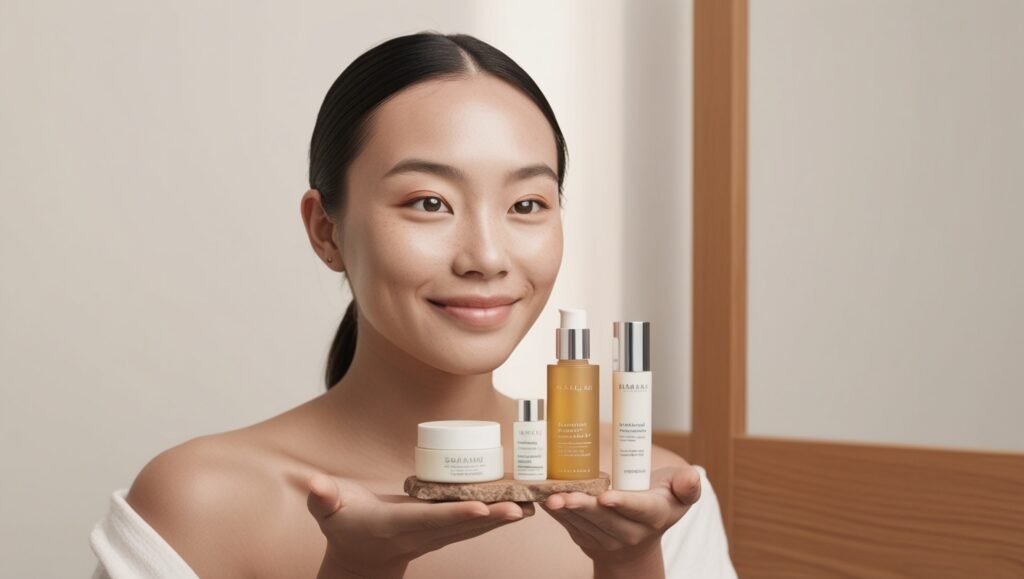
Start simple, be patient, and enjoy the process of taking care of your skin! We hope that we cover the topic “skincare for beginners” from all aspects, If you have a question, please contact us immediately

